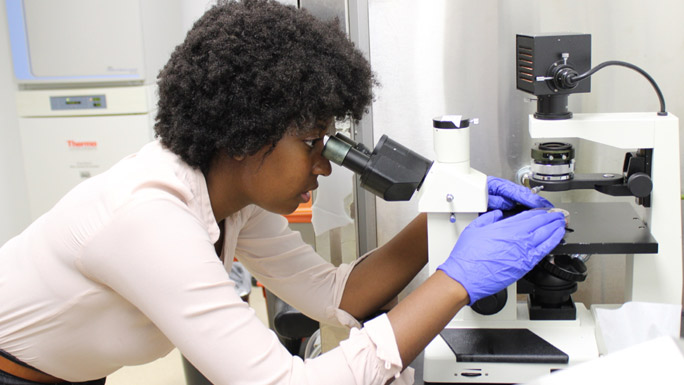American Cancer Society Research Internship

The American Cancer Society (ACS) Research Internship at UChicago is a cancer research training program for undergraduates interested in careers in biomedicine. For ten weeks during the summer, participants work full time in the laboratories of established cancer researchers at the University of Chicago, gaining hands-on experience in areas at the forefront of the field.
Rigorous research training is complemented with year-round career development and skill-building workshops, leadership training, opportunities in community outreach and engagement, and personalized mentorship for post-baccalaureate transitions.
The internship program is funded by a grant from the American Cancer Society.
About the ACS Research Internship at UChicago
Internships consist of a ten-week summer research experience plus monthly academic year activities. The summer research experience generally runs from the second week of June through the second week of August. Specific dates are announced with the release of application materials each fall.
Please note that accommodations may be made for students whose academic calendar conflicts with the internship program.
2026 ACS Research Internship Dates
The 2026 ACS Research Internship summer research experience runs from June 7 – August 14 (35-40 hours/week).
Monthly enrichment activities are held on select evenings and weekends, via Zoom, from September 2026 through May 2027. They require 2-4 hours of effort each month.
- Hands-on experience in a cutting-edge laboratory or research group
- Year-round career development and skill-building workshops, leadership training, and opportunities in community outreach and engagement
- Personalized mentorship for post-baccalaureate transitions
- Taxable stipend of $5,000
- College sophomore or junior at time of application
- At least 16 years of age at start of program (for Summer 2026: June 7, 2026)
- Strong interest in a career in scientific research or medicine
- Strong academic record, particularly in math and science
- Able to commit to the yearlong program, including a 10-week summer research experience (40 hours/week) and monthly enrichment activities throughout the subsequent academic year
Please note that students are responsible for their own housing and transportation to and from the University of Chicago during their summer research experience.
Conflict of Interest Policy: The selection of applicants is managed by the program leadership team. Immediate family members of the leadership team or of UChicago faculty are ineligible for the program. All applications will be subject to the Conflict of Interest Policy.
Six trainees are selected each year based on their demonstrated passion for science, interest in careers in biomedicine, and capacity to perform in a professional research setting. To apply:
-
Submit the online application form by 11:59 pm CT on Monday, January 19, 2026.
The online application form is accessible here:
https://redcap.link/2026UCCCCPathwayPrograms.
New this year: we are using a common application for all Pathway Programs — you may apply to all eligible programs with one form. - Arrange for two recommenders (at least one must be a teacher/professor) to complete the online recommendation form by 11:59 pm CT on Monday, January 19, 2026. Download an instruction sheet for recommenders here. Recommenders can access the online form here: https://redcap.link/PathwayProgram_Rec2026.
- Applicants who advance to the second round: complete an in-person interview with the program leadership team, scheduled for Monday, February 16, 2026.
Be prepared to enter the following information
- Academic information (including your GPA and most recent transcript, unofficial or official)
- Contact information
-
Responses to the questions below (limit 250 words per response):
- Of the learning opportunities related to careers in science and medicine, why have you chosen to apply to our program(s)? For example, discuss how the program relates to your academic and career plans, the nature of your interest in cancer, or what you hope to gain from the experience.
- What qualities and experiences do you have that best prepare you for the scientific and professional demands of our program(s)?
- Scientific progress depends on an array of expertise and perspectives. Tell us about an aspect of your perspective, viewpoint, or lived experience that is important to you, and describe how it shapes the way you would learn from and contribute to our research community.
- Is there anything else important for us to know about you?
APPLICATION DEADLINES
- January 19, 2026: Application and two recommendations due by 11:59 pm CT
- February 16, 2026: On-campus admissions interviews
- March 2, 2026: Acceptance notification
- March 16, 2026: Commitment deadline
